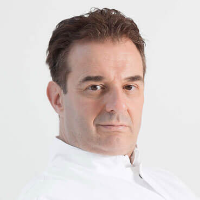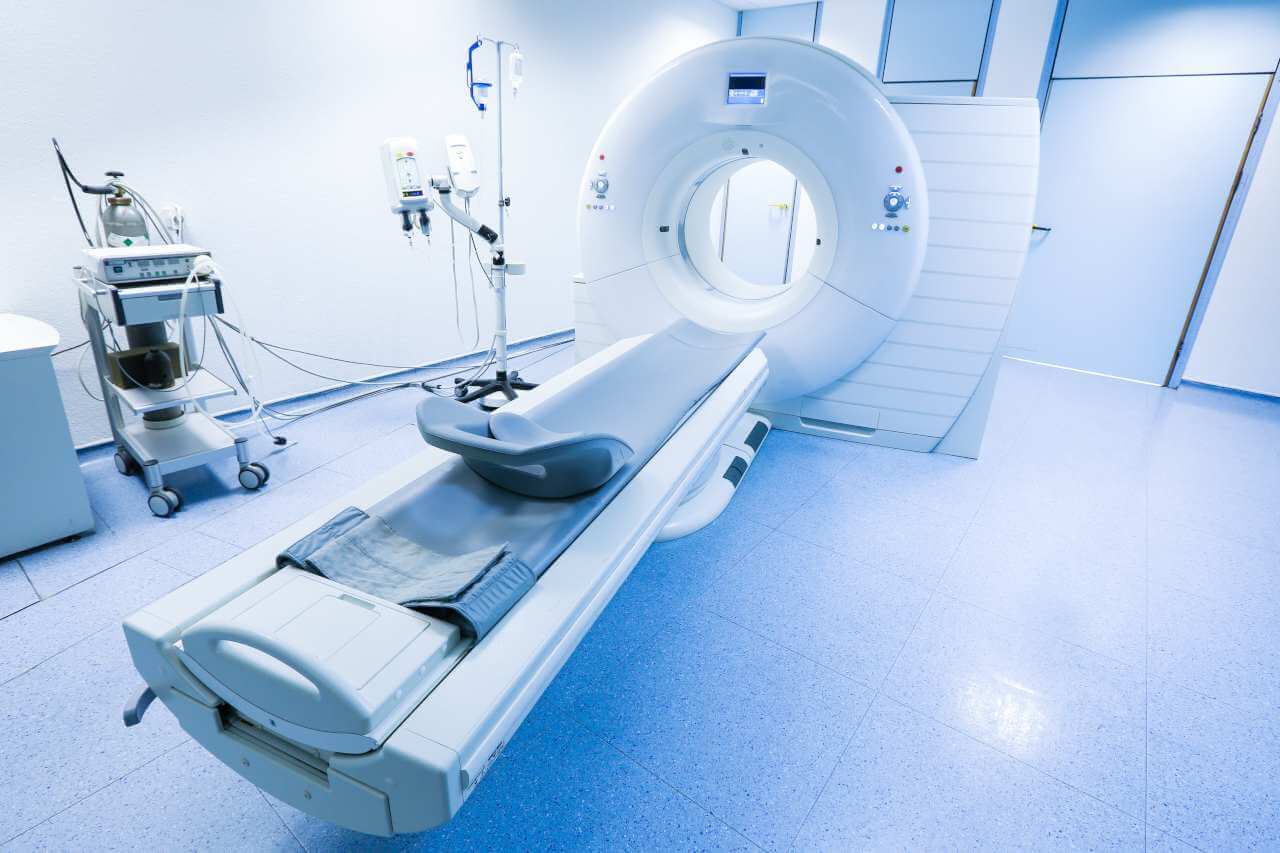
The program includes:
- Initial presentation in the clinic
- clinical history taking
- physical examination
- laboratory tests:
- complete blood count
- biochemical analysis of blood
- indicators of inflammation
- indicators blood coagulation
- ophthalmologic examination:
- ophthalmoscopy
- gonioscopy
- pachymetry
- perimetry (visual field test)
- computerperimetry
- Goldmann-primetry
- fluorescein angiography
- thermography
- capillary microscopy
- testing for optic nerve damage
- tonometry
- intraocular pressure measurement
- preparation according to preoperative standard
- treatment of congenital glaucoma with total or basal iridectomy
- symptomatic treatment
- cost of required medications
- nursing staff services
- elaboration of further recommendations
Required documents
- Medical records
Service
You may also book:
 BookingHealth Price from:
BookingHealth Price from:
About the department
The Department of Adult and Pediatric Ophthalmology at the Meoclinic Hospital Berlin offers the full range of services for the prevention, diagnostics and treatment of diseases of the organ of vision. The department's doctors have a wide arsenal of modern diagnostic techniques, which allow them to comprehensively examine the eye and detect the cause of reduced visual acuity and the development of other pathologies, including at the early stages. In the field of diagnostics, special attention is paid to the early detection of glaucoma and secondary ophthalmic diseases in arterial hypertension and diabetes mellitus. The department's specialists deal with the treatment of all pathologies, while most often patients with cataracts, glaucoma, corneal, retinal, vitreous, optic nerve, lacrimal duct and eyelid diseases seek medical help in the department. Children can also receive medical care in the department. The work of the department's medical team is based on an individual concept of patient care, which allows achieving the best therapeutic results. The department has a reputation as one of the best Eye Centers in Germany, and therefore when choosing treatment here, patients trust their vision to true professionals in their field.
The department is headed by Prof. Dr. med. Manfred Tetz. According to the Focus magazine, the professor is one of the best ophthalmologists in Germany specializing in refractive eye surgery and cataract surgery. The doctor has successfully performed more than 100,000 surgical interventions for ophthalmic diseases, which indicates his highest professionalism and experience.
Cataract is one of the most common pathologies in modern ophthalmology, so the department offers the very latest treatments for this disease. Cataract is a partial or total clouding of the eye lens, which without timely treatment leads to irreversible changes, up to total vision loss. The disease most often develops in elderly people, but the pathology may also be caused by traumatic injuries, malformations, metabolic disorders, etc. In addition, cataracts are also detected in young children. Since the disease progresses slowly, the patient may not be aware of its presence for a long time, but the department's doctors detect pathology at the earliest stages, which significantly increases the chances of a successful treatment outcome. The main diagnostic method for suspected cataracts is an eye examination with a special slit lamp (biomicroscopy). Should the diagnosis be confirmed, the ophthalmologist will proceed to plan a treatment regimen, which is usually based on surgery. Only surgical treatment can improve vision and prevent blindness. In case of congenital cataract in a child, the department's specialists recommend not to delay the operation, otherwise there is a risk of irreversible visual impairment in a young patient. The best period of time for cataract surgery in a child is considered to be 5-6 weeks of life. With cataract detected in both eyes, the operation must be performed no later than 10 weeks after birth. The essence of cataract surgery is to remove the clouded part of the lens or the entire lens, after which an intraocular lens (artificial lens) is implanted. In most cases, cataracts affect both eyes at once, but surgery is performed alternately – the cataract is first removed in one eye, and after the patient's recovery, the next operation is planned. The operation is performed on an outpatient basis. The patient receives a local anesthetic in the form of eye drops. The duration of the surgical intervention is about 30 minutes. The department's specialists carry out cataract treatment with minimal health risks and guarantee high safety of the surgical intervention.
The department's medical team often deals with the treatment of glaucoma, including in children. Glaucoma is an elevated intraocular pressure, which causes a decrease in visual acuity and optic nerve atrophy. Pathology progresses rapidly and without timely therapeutic measures becomes the cause of irreversible vision loss. To detect glaucoma, the department's doctors perform ophthalmoscopy (examination of the fundus with the help of special instruments), intraocular pressure measurement, visual field testing, and examination of the anterior chamber angle. At the early stages of glaucoma, the department's specialists prefer conservative therapy: intake of drugs for improving intraocular fluid outflow, drugs for inhibiting intraocular fluid production, drugs for normalizing intraocular pressure. Nonetheless, in many cases, patients with glaucoma still require surgery. The decision is made on an individual basis, with due consideration of a particular clinical case. The department's specialists offer such surgical treatment options for glaucoma as trabeculotomy, laser trabeculoplasty and iridectomy. After the operation, the patient receives the appropriate care and recommendations for follow-up recovery after the surgical intervention.
Another focus of the department's work is on the treatment of retinal diseases: macular hole, retinal degeneration, macular edema, macular degeneration and diabetic retinopathy. These pathologies can lead to serious visual impairment. The patients with retinal diseases are most often prescribed laser photocoagulation. The procedure is carried out on an outpatient basis and is based on the thermal effect of a near-infrared laser. The department's doctors usually use an argon laser, sometimes a krypton laser. During the procedure, the patient is in a sitting or lying position. Prior to laser photocoagulation, the specialist uses eye drops for local anesthesia. After the procedure, the patient is forbidden to drive a vehicle for 24 hours, and it is also necessary to avoid physical activity for several days after laser therapy. Whenever required, drugs will be additionally prescribed in the form of drops and ointments.
The department's medical team also specializes in laser vision correction (for example, for farsightedness, nearsightedness), corneal transplantation, intravitreal injections for the treatment of age-related macular degeneration, subconjunctival injections and other therapeutic procedures that can effectively get rid of vision problems.
The department's range of medical services includes:
- Diagnostic options
- Autorefractometry
- Optical coherence tomography
- Corneal topography
- Pachymetry
- Intraocular pressure measurement
- Biomicroscopy
- Visual field testing
- Gonioscopy
- Therapeutic options
- Surgical treatment of glaucoma in adults and children
- Trabeculotomy
- Laser trabeculoplasty
- Iridectomy
- Surgical treatment of cataract (intraocular lens placement) in adults and children
- Laser coagulation for the treatment of retinal diseases and surgical treatment of retinal pathologies
- Refractive eye surgery to correct nearsightedness, farsightedness and astigmatism
- LASEK
- Femto LASIK
- Intraocular lens implantation
- Corneal transplantation (keratoplasty)
- Perforating keratoplasty
- Lamellar keratoplasty
- Femtosecond laser-assisted keratoplasty
- Intravitreal injections for age-related macular degeneration and retinal vascular occlusion
- Subconjunctival injections
- Surgical removal of the conjunctiva, eyelid tumors, cysts, atheromas, chalazion, xanthelasma, milia
- Surgical repair of entropion, ectropion and droopy eyelid
- Treatment of dry eye syndrome
- Surgical treatment of glaucoma in adults and children
- Other medical services
Curriculum vitae
Professional Career
- Since 1986 Two years abroad: Salt Lake City Medical Center, Utah; IOL Research Center, Medical University of South Carolina, Charleston, South Carolina.
- 1986 - 1988 Feodor Lynen Scholarship of the Alexander von Humboldt Foundation: histopathological and scanning electron microscopic examinations of interactions between intraocular lenses and choroidal tissue structures.
- 1988 - 1993 Assistant Physician, Department of Ophthalmology at the University Hospital Heidelberg.
- 1993 - 1998 Managing Senior Physician, Department of Ophthalmology at the University Hospital Heidelberg.
- 1993 - 1998 Head of the Ophthalmic Pathology Laboratory in the Department of Ophthalmology at the University Hospital Heidelberg.
- 1995 - 1996 Establishment and development of the section for outpatient surgical treatment of cataracts and pathologies of the anterior segment of the eye in the Department of Ophthalmology at the University Hospital Heidelberg.
- 1998 Professorship for Ophthalmology, Department of Ophthalmology at the Charite University Hospital Berlin, Faculty of Medicine, Humboldt University of Berlin.
- 2003 Founding of the renowned Spreebogen Ophthalmology Clinic and opening of the ADC Ophthalmic Diagnostic Center.
- 2004 Inpatient operations in the Eye Clinic in Ringcenter.
- 2005 Founding of the Berlin Eye Research Institute (BERI).
- 2008 Operations at the Evangelical Hospital Waldkrankenhaus Spandau.
- 2009 Head Physician in the Department of Adult and Pediatric Ophthalmology at the Meoclinic Hospital Berlin.
Clinical Interests
- Surgical treatment of glaucoma.
- Surgical treatment of cataract.
- Laser coagulation.
- Refractive eye surgery.
- Surgical treatment of retinal pathologies.
- Corneal transplantation.
Senior Management Positions in Professional Associations
- Elected Board Member of the European Society of Cataract and Refractive Surgeons (ESCRS), ESCRS Membership Certificate.
- Board Member and Treasurer of the German-Speaking Society of Intraocular Lens Implantation, Interventional and Refractive Surgery (DGII).
- Berlin Ophthalmological Society.
Memberships in Professional Societies
- American Academy of Ophthalmology (AAO).
- American Society of Cataract and Refractive Surgery (ASCRS).
- Berlin-Brandenburg Ophthalmological Society (BBAG).
- German Ophthalmological Society (DOG).
- VISUDOC AG Working Group.
Achievements
- Author of over 300 scientific publications.
- Conducted more than 1,100 scientific lectures and presentations at national and international congresses.
- International advanced training courses and WET LAB (lectures and courses) for surgeons.
- More than 100,000 surgical interventions for eye pathologies.
Photo of the doctor: (c) Meoclinic
About hospital
The Meoclinic Hospital Berlin is one of Germany's most renowned multidisciplinary private hospitals offering top-class and patient-centered medical care. The hospital opened its doors to patients back in 2000 and today is deservedly proud of its vast experience. It has 28 specialized departments, each of which is responsible for the treatment of a particular group of diseases. A highly professional medical team consisting of 67 doctors takes care of the health of patients. The basis of the work of the doctors of the hospital is the use of the most advanced and, if possible, sparing treatment methods. The hospital is certified according to ISO 9001:2015 standards, so patients benefit from the highest level of the quality of service, adherence to hygiene and safety standards.
The hospital includes almost all fields of modern medicine: internal medicine, general and abdominal surgery, endocrine surgery, vascular surgery, hernia repair surgery, hand surgery, plastic surgery, pediatric surgery, cardiology, pulmonology, gastroenterology, rheumatology, proctology, gynecology, urology, ophthalmology, orthopedics, neurology, neurosurgery. To provide surgical treatment, the hospital has three high-tech surgical suites, which perform both minimally invasive interventions and DaVinci robot-assisted interventions, as well as the most complex operations lasting several hours. In addition, the hospital has an advanced Radiology Center with innovative devices for computed tomography, magnetic resonance imaging, ultrasound diagnostics and X-ray scanning. These resources allow providing accurate diagnostics and effective treatment of the highest European level.
Despite the fact that the hospital has advanced technologies and modern infrastructure, the focus of the medical staff is on the patient – his needs, wishes and well-being. During the treatment in this medical center, patients are surrounded by care, comfort, and they are treated with maximum respect and understanding. The doctors of the hospital use all their professionalism and medical knowledge for the benefit of patients, saving lives even in particularly complex cases.
Photo: (с) depositphotos
Accommodation in hospital
Patients rooms
The patients of the Meoclinic Hospital Berlin live in well furnished rooms, corresponding to the level of luxury five-star hotels. There is a fantastic view from the windows of the patient rooms on the Gendarmenmarkt, the Reichstag, the Friedrichstrasse or the courtyard of the hospital. The hospital has a pleasant atmosphere, which is also facilitated by soothing colors. The standard patient rooms include a comfortable bed, a bedside table, a desk and chairs, a wardrobe with a built-in safe for storing valuables, air conditioning, a minibar, a TV and a telephone. Free Wi-Fi is available in the patient rooms. Each patient room has an ensuite bathroom with shower and toilet, heated floor. There are bath slippers, towels and toiletries in the bathroom. A bathrobe, shower caps, shaving kit and hairdryer are available upon request.
Meals and Menus
The patients of the hospital are offered tasty and healthy three meals a day: breakfast, lunch and dinner. The menu mainly includes vegetable, fruit, poultry and fish dishes. Each patient has a choice of several menus, including traditional Russian and Arabic cuisine, as well as kosher and vegetarian meals.
If for some reason you do not eat all foods, you will be offered an individual menu. Please inform the medical staff about your dietary preferences prior to treatment.
Further details
Standard rooms include:
Accompanying person
Your accompanying person may stay with you in your patient room or at the hotel of your choice during the inpatient program.
Hotel
You may stay at the hotel of your choice during the outpatient program. Our managers will support you for selecting the best option.




